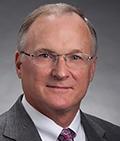Aiming for a More Evidence-Based Approach to Medical Practice — How to Get There Using Secondary Data for Outcomes Research
Tuesday, 10 a.m.-noon
Upper 24A-C
Learn about using large secondary data sets for health services research that could affect health policy and the delivery of care by attending “Aiming for a More Evidence-Based Approach to Medical Practice — How to Get There Using Secondary Data for Outcomes Research” from 10 a.m. to noon tomorrow in Upper 24A-C.

Thomas R. Miller, Ph.D., M.B.A.
The session will feature six speakers discussing topics from developing a research agenda to the types of data available, to how to get research published, said the session moderator, Thomas R. Miller, Ph.D., M.B.A., ASA Director of Health Policy Research.
“This session is for those physician anesthesiologists interested in not just clinical and basic science research, but health services research and research that can help inform policy,” Dr. Miller said. “It features six short talks to expose people who are interested in this, particularly young anesthesiologists who want to network and learn what research opportunities there may be.”
Although the session can be a starting point for those getting started in research, it also features well-known researchers addressing specific topics in key areas.
“Anesthesiologists have a history of conducting great clinical research, for example, comparing drugs and procedures,” Dr. Miller said. “What they have done less frequently is health services research. These are not randomized trials, but are studies that use large and secondary data sources to answer questions such as how care is delivered, how it is paid for, what are the outcomes and what is the patient experience.
“Typically, these data come from Medicare, commercial insurers and clinical registries. Often, you have one or two physicians at one location who are not as familiar with these data sources and the research being done with them, so ASA and FAER have worked together to organize the session.”
Speakers and their topics are:
- Daniel I. Sessler, M.D., Chair of the Department of Outcomes Research at Cleveland Clinic, “Overview: Big Data and Outcomes Research in Anesthesia.”
- Laurent G. Glance, M.D., Professor and Vice Chair for Research in the Department of Anesthesiology at the University of Rochester School of Medicine, “Cardiac Surgery — Do Teams Matter?”
- May S. Hua, M.D., from the Department of Anesthesiology at Columbia University and recipient of the FAER Health Services Research Mentoring Award, “Building a Program of Research Using Secondary Data.”
- Lee A. Fleisher, M.D., Robert Dunning Dripps Professor of Anesthesiology and Critical Care and Chair of the Department of Anesthesiology and Critical Care at the University of Pennsylvania Health System, “Addressing Research Questions Which Can Influence Health Policy.”
- Kevin K. Tremper, M.D., Ph.D., Professor of Anesthesiology at the University of Michigan Health System, “Creating a Community for Evidence Creation and Implementation.”
- Thomas Vetter, M.D., M.P.H., Professor, Vice Chair and Director of the Department of Anesthesiology and Perioperative Medicine at the University of Alabama, Birmingham, “Overcoming the Challenges of Getting Perioperative Health Services Research Published.”
Evan Kharasch, M.D., Ph.D., Professor of Anesthesiology at Washington University School of Medicine, St. Louis, will provide closing remarks.
